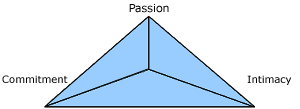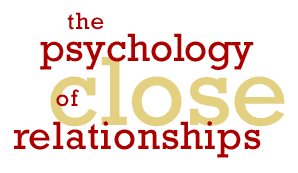






|
Yes, this is another odd/even mix-up of items! This exercise distinguishes between two sets of attitudes identified by Zick Rubin: liking and loving. In the
above scale, the five odd-numbered items reflect liking, while the five even-number items reflect love. The sum of your
ratings for items 1, 3, 5, 7 and 9, we call your Liking Score. The total of your ratings of the even-numbered items, we call this your
Love Score. Which is higher?
Your scores for the one you love are probably both pretty high. However, a difference between the Liking and Love Score can indicate
a slight disparity between your two attitudes toward this one person.
For example, if you love your person somewhat more than you like your person, this can mean that your relationship could use some of
the companionate components that would carry it through difficulties. Liking someone significantly more than you love someone can mean
yours is more of a friendship than a love affair (but recall the discussion above of how passion can wane -- and wax -- while
friendship is generally a more stable, unvarying connection).
To get another sense of these results, complete this exercise again, this time filling in the blanks with the name of someone who
is a close, platonic friend. The pattern of scores might be different in ways that characterize some of the differences between love and liking.
Love as Self-Expanding
This loving evaluation of another not only reflects an attitude, it can act on us. Arthur Aron and Elaine Aron who have argued that as
two people become closer in love, their thoughts and perceptions of the world and themselves become joined.
When you love someone, you pay attention to how the other person thinks, talks about, and sees the world. You share your views by
communicating and self-disclosing (processes we'll explore in detail in Session 5, the next lesson of this course). By offering your own
unique perspectives and accepting the other's views into your own way of thinking, you are expanding your sense of self. This self-expansion generally improves your
life, adding to your knowledge and flexibility, giving you greater resources and abilities to cope and create, whether in the relationship or on your own. (See
the interview concluding this session for a more detailed interaction with scholar Art Aron).
The Arons' self-expansion theory can help explain why even a short-lived or superficial "love" might leave a lasting impression on
one's sense of self. When I was 12, I developed a huge crush on a boy in my class who, among other hobbies, loved horror movies. To win his
approval, I took an interest in horror stories myself. Though the crush went the way of most crushes, I've maintained a happy, lifelong
passion for horror and science fiction in print and film. Years later, as a university student studying psychology, I briefly dated a
guy who was an architecture student. Spending time with him in the architecture library, I discovered a fascinating literature on
environmental psychology, a perfect overlap of our interests. I stayed interested in this field long after the dating relationship
fizzled, and made it part of my own teaching and research. Have you had similar experiences?
In short, those to whom you give your heart can also expand and enhance the best qualities of your mind -- yet another explanation
for not only how but why human beings are motivated to fall in love.
Love as a Blend of Passion, Intimacy and Commitment
The theorists introduced above have proposed that love is a feeling, an attitude, or a deep connection involving someone special.
So which is it?
Psychological theories can drive you (and me) crazy because they seem to be competing with each other, as if only one view of process
could be right, and to accept one you must reject the others. Well, this isn't so!
As you can see, emotion theory concentrates on the arousing aspects of love; connection theories focus on the closeness
and communication that develop in loving relationships; and cognitive theories how love is influenced by our thoughts and also how it influences out throughts and attitudes.
All these are interwoven in love. When you love someone, you feel, act and think in specific ways. No single psychological theory
encompasses all these processes but each has been useful in helping understand one thread or the other, better.
Psychologist Robert Sternberg proposes that love is really any of several psychological experiences involving a varying mix of three
components: passion, intimacy and commitment to each other. Some experiences of love consist of only one of these
factors. Love that is, for example, all passion without intimacy or commitment is infatuation , as when a fan adores a celebrity
but has no real closeness or future with the other person. Intimacy and passion without commitment make romantic love , and with
the addition of commitment make consummate love . This "triangular theory" of Sternberg's explains why many different forms
of love exist that seem to share some features yet differ greatly from each other.

Love Styles
As difficult as it is to define love for yourself, it is even more difficult to match your view of love with that of another. Each of us
has our own style of love and falling in love will be one-sided unless we meet someone who connects with that style. Choose one or two of the following statements as
best characterizing your experience of love with this individual:
- Good looks and sexual passion are important in my experience of an intense physical and emotional attraction.
- I like playing the field, looking for someone, finding and pursuing that relationship. The thrill is
in the chase and in keeping the other person guessing.
- I like to get to know someone slowly over a long period of time before making a complete
commitment. I may not experience love as a great passion but more as a deep and lasting friendship.
- I love the thrill of new love but it is agony not to know where I stand. I feel possessive of my
lover, even desperate to be together. My emotions can leave me feeling "out of control."
- As long as the other person is happy, I'm happy, whether or not I get love in return. I will do
all I can for the one I love with little concern for myself.
- I couldn't love someone who didn't have just the right qualities to be a part of my life. If the
person has the right job, age, background and other attributes that's the one for me.
These six items reflect six styles of love identified by Canadian psychologist John Alan Lee. Item 1 reflects erotic love, a romantic
passion focused on physical attraction and sexual arousal. Item 2 describes a lighthearted, game-playing attitude in which love is made
of pursuit and uncertainty, not commitment. Item 3 indicates a slowly developing attachment sometimes called "best friends" love. Item 4 is
manic love based on insecurity and obsession, feeding one's jealousy and even making both persons unhappy. Item 5 is an idealistic,
altruistic love based on giving and caring out of selfless duty. Finally, item 6 reflects a practical, unsentimental sort of
"checklist" love in search of the best match.
Love as an Interaction of Styles
Clyde Hendrick and Susan Hendrick have studied Lee's six styles among modern young adults, identifying some patterns. Men tend more
to game-playing, while women tend to be more pragmatic and oriented toward lovers as best friends.
Another valuable lesson lies in understanding how combinations of styles might proceed. Recall the vignette at the beginning of this
lesson, where Deirdre's manic need for Evan's presence and reassurance actually seems to drive him away. Some styles of love may
seem more attractive or healthy than others. But because "it takes two to tango," it's also the couple's unique combination of
styles that will determine their experience of love.
Next Session
In our next session, we will be examining this interaction of individual styles and expectations of love in relationships.

|




